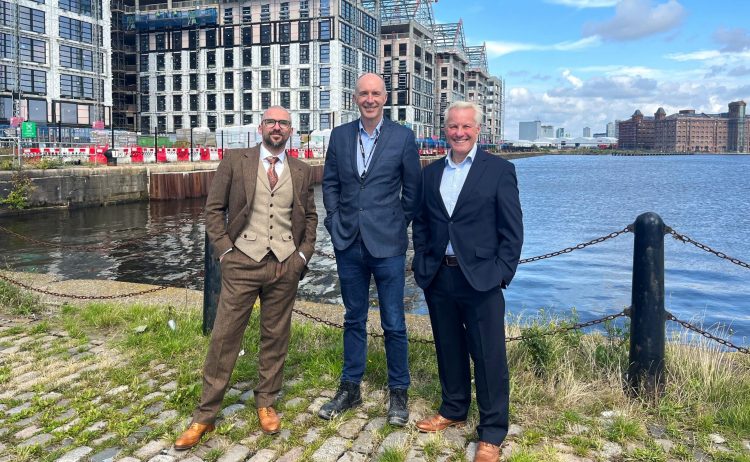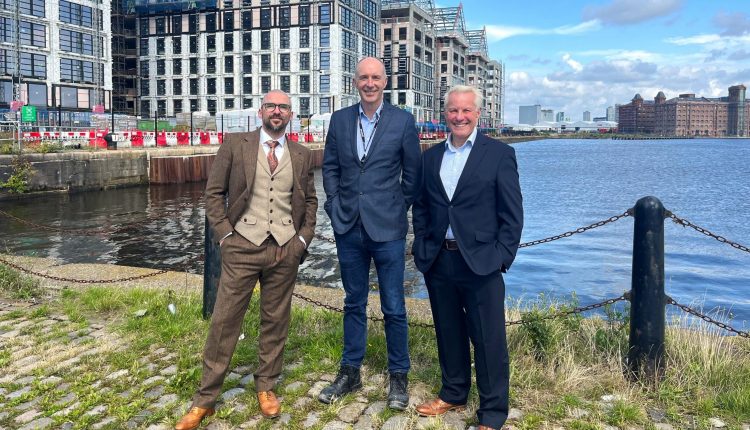A £130m scheme to build 500 homes at Wirral Waters joins groundbreaking research project to reduce the volume of plastics used in construction. Tony McDonough reports

Wirral Waters’ £130m Miller’s Quay residential development is to take part in a pioneering research project that aims to reduce the use of plastics in the construction sector.
Construction is the second-largest user of plastic after the packaging industry. It is used in design, construction materials and packaging and produces 50,000 tonnes of plastic packaging waste each year in the UK.
In 2019 former fit-out entrepreneur Neal Maxwell co-founded Changing Streams, a not-for-profit organisation. It works with experts at the University of Liverpool. Neal was the founder of Liverpool fit-out firm Aztec which he has now exited.
In 2021 Peel L&P, owner of the multi-billion pound Wirral and Liverpool Waters projects, became a member of Changing Streams CIC and signed up to its charter. This sets out a clear mission and ambition for reducing plastic in the construction industry.
A partnership was then formed bringing together Peel L&P and its construction partners with Changing Streams and researchers from the University of Liverpool. They aimed to identify where sustainable plastic-free alternatives can be used in the building sector.
This partnership is now working to identify the amount of plastic used in construction, to develop tools to design out plastic, and to establish new R&D opportunities to produce the plastic-free materials of the future.
Miller’s Quay, Peel L&P’s cornerstone residential scheme at Wirral Waters which celebrated its topping out ceremony last month, will be a key part of the research project.
Over the next few months, the £130m residential development will become a hotbed of research and analysis. Academics will assess the potential for the construction industry to reduce the volume of plastics being used.
Working with The University of Liverpool, Changing Streams acts as the bridge between academia and industry to drive and effect change and reduce our plastic footprint.
The charter includes a commitment from members to significantly reduce plastics in the construction industry, whether in design of the building, materials or packaging.
Dr Gareth Abrahams, co-founder and head of building design research at Changing Streams CIC, said: “We are seeing a shift in the way that we design and construct the buildings that surround us and the buildings that we call ‘home’.
“As part of this shift, many of us are asking some very important questions about the way they perform – how much energy do they need to keep us warm or cool.
“But so far, there has been far less attention on the things we need to build these homes. This is not just about embodied carbon but also about embodied plastic.
“This partnership is the first dedicated attempt to tackle this issue on a large, landmark scheme such as Miller’s Quay.
“Our first project together will be an initial step in a long-term plan that will help position Liverpool city region as a thought leader and driver of change in the construction industry.”
In January 2002 Peel L&P, announced that institutional investor Pension Insurance Corporation (PIC) was funding the Miller’s Quay scheme. Wirral Council is also a partner on the Build-to-Rent development.
When complete it will provide 500 one and two-bedroom apartments. One-fifth of the homes will be classed as affordable. Rents on the affordable units will be a maximum of 80% of open market value. Building firm GRAHAM is the contractor for the scheme.
Richard Mawdsley, director of development for Wirral Waters, added: “Miller’s Quay was designed to be at the forefront of sustainable regeneration. So it is fitting that it should also serve as a pilot for this new partnership.
“Over the last 12 months, the team have already worked together to identify the ‘hidden’ plastics within the specification and detailed design of the building and have established new tools that can help remove them on future projects.
“We want to make Wirral Waters one of the most sustainable regeneration projects in the UK, and we cannot achieve this without tackling the issue of plastics in the construction process.”

